Scarlet Macaws

OUR SCARLET MACAWS
While area visitors are thrilled to see whales, toucans, monkeys, anteaters, coatis, and many other jungle and ocean creatures, none bring as much thrill, excitement and amazement as our colorful Scarlet Macaws. These birds are huge, with massive red tails and brilliant red, yellow and blue plumage. They appear in a crazy swirl of screeching and color, mesmerising everyone within eyeshot vicinity.
Scarlet Macaws belong to the ara macao cyanoptera species and are endemic to Costa Rica. They usually fly in pairs or family groups (usually 2, 4 or 6 birds, rarer a bigger flock) and most people will hear them long before they are able to see them. I have seen Scarlet Macaws in a variety of habitats, from the Beach Almond trees of Playa Ventanas to the high hills that rise behind the coastal highway.
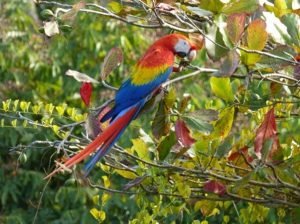
WHERE CAN YOU SEE SCARLET MACAWS?
Scarlet Macaws used to be common across Costa Rica but in recent decades their range has greatly decreased. Today, other than their main home on the Osa Peninsula, isolated populations can be found up and down the Pacific Coast as well as along the northern areas of the country. I have often seen them at the local beaches like Playa Ventanas, Tortuga and Hermosa, around Garza Island and in the hills around Jaco just off the coastal highway. I see (or hear) a pair or two nearly every day, flying high over the foothills of Ojochal and Uvita.
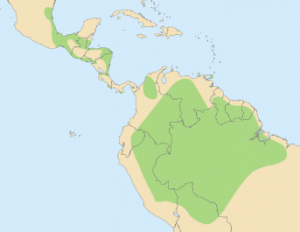
WHY HAVE SCARLET MACAWS BECOME SO RARE IN COSTA RICA?
Two main reasons. First one is deforestation. To successfully breed, Scarlet Macaws need nesting cavities found in huge, old growth trees. They also need the cover, food and shelter provided by many species of native fruit and nut trees. Unfortunately Costa Rica has seen dramatic deforestation in recent decades, destroying the trees Scarlet Macaws need for food, shelter, and nesting. The second reason is pet trade – for decades Scarlet Macaws and their chicks have been poached to supply the insatiable global demand for these majestic birds. The pressure from habitat loss as well as removal of adult birds and, especially, chicks have placed the species under extreme stress.
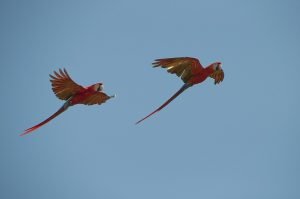
SO WHAT HAPPENS NOW?
Thankfully, the logging of old growth forests has been illegal in Costa Rica since 1996. Trade in wild-caught pets has been banned in 2012. With these two main pressure points released, the emergence of Costa Rica as one of the world-leading ‘green’ destination and continued efforts to breed and re-introduce Scarlet Macaws to their past range there is much hope and optimism for the recovery of the species.
HOW CAN I HELP?
Easy – if you live here, plant some Beach Almond trees on your land (Macaws LOVE the fruits – even though this tree is neither native to Costa Rica, nor is it a true Almond, it has become their staple). In a few years’ time you may get a few colorful visitors to your property while at the same time you will be helping the Scarlet Macaws make a full recovery. This is especially important since Beach Almond trees are ‘messy’ and do not make popular landscaping trees (messy because they drop a ton of leaves, often). But funnily their messiness is why they have been introduced here – the Europeans, missing the four seasons, longed for a tree that drops its leaves and makes it feel like ‘autumn’ – and the Beach Almond is one of the few tropical species which does just that. So take one for the team, deal with a leafy mess a few times a year and help out the Scarlet Macaws!
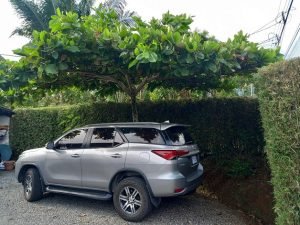
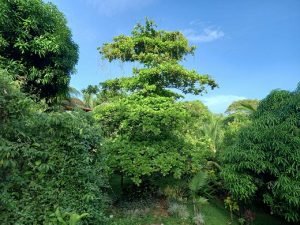
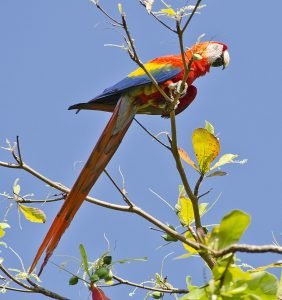
INTERESTING SCARLET MACAW FACTS
- Scarlet Macaws mate for life.
- With an average wild lifespan of 60 years and some captive specimens living to over 100 years old, Scarlet Macaws are amongst some of the world’s longest living birds and animals.
- Their beaks are incredibly strong – not only are they able to crack nuts and tough seeds, Scarlet Macaws have been known to use their beaks to crack coconut shells!
- Scarlet Macaw is one of the 17 species of Macaws and one of the two species which calls Costa Rica home (the other being the Great Green Macaw that prefers the Caribbean coast).
Would you plant a Beach Almond tree on your property to give Scarlet Macaws a hand-up? Do you want to wake up to the sounds and sights of a lush jungle? Let us make your dreams a reality – visit the RE/MAX We Sell Paradise website to meet your trusted real estate partner, or perhaps browse the hot properties in our local area and imagine yourself waking up to our mesmerizing Macaws!



